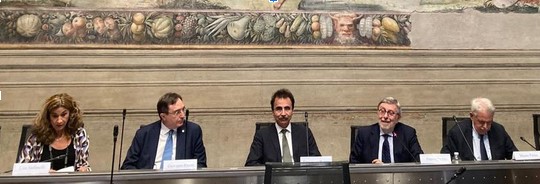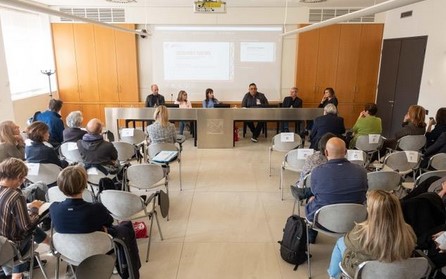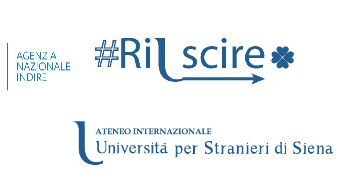On October 13, 2023, the International Day of Education in Prison was celebrated in Italy with an event promoted by CNUPP1) (the National Conference of Delegates of Rectors for University Penitentiary Centres), at the headquarters of CRUI2) (the Conference of Rectors of Italian Universities) in Rome. The title of the event was: The commitment of Italian universities to higher education in the penitentiary system. Besides the delegates from CNUPP, the event was attended by the chiefs from the penitentiary administrations (DAP – Department of Penitentiary Administration, and DGMC – Department of Juvenile Justice and Community), the Guarantors for the rights of individuals deprived of their personal freedom, and representatives of other levels of education within the prison system. In its role as President of the CNUPP, Franco Prina, presented the Conference itself, with its commitments and achievements.
Institutional Speakers Cira Stefanelli (DGMC) Giovanni Russo (Head of DAP) Francesco Bonini CRUI)
The Conference is an organization that aims to coordinate and develop activities undertaken by universities to ensure that individuals deprived of their personal freedom have the chance to exercise their right to pursue university studies. Additionally, it acts as a representative body of the university system in its interactions with penitentiary administrations, promoting agreements, protocols, and guidelines that enable the presence and educational activities within jails and external correctional services (probation offices). Established in 2018 with subscriptions of 22 universities, it currently brings together 44 universities from all regions of Italy, ensuring the right to access university studies in approximately 100 penitentiary institutions.
In the Academic Year 2022/23, there were 1,458 students enrolled in the University Penitentiary Centres, a number that has been steadily increasing year by year. This growth in the number of enrolled students and participating universities is representative of a reality that places inclusivity among its foundational values. Another indicator of the inclusivity of this organization is the diversity of detention regimes to which the students in the University Penitentiary Centres are subjected: these regimes range from Juvenile Correctional Institutions (IPM) where also young adults up to 25 years old can be confined, to medium-security penitentiaries, to detention centres that often host high-security inmates, and even to inmates subjected to the 41 bis regime (reserved for leaders of criminal organizations).
In the year 2022 there were a total of 51 degrees, including both bachelor’s degrees and master’s degrees, awarded within University Penitentiary Centres. The educational programs aim to be as wide as possible, ensuring an answer to the individual choices of students deprived of their personal freedom. However, there are practical limitations to the chance of providing all courses of study due to concrete factors, such as mandatory presence for certain courses, participation in laboratories or internships, and especially internet access inside jails, a theme on which the Department of Penitentiary Administration (DAP) and CNUPP are dialoguing and collaborating on. During this meeting, has been taken the chance to remember that the involvement and commitment of Italian universities within penitentiary institutions go beyond ensuring the right to higher education for detainees. Universities are also engaged in research activities within and about the penitentiary system, under several academic disciplines. Third mission initiatives or public engagement ones are promoted: such as supporting and training penitentiary administration personnel and volunteers, or events and initiatives that are organized with the intention of making more transparent, known and permeable to valuable collaborations with local communities and society, a reality often forgotten and ignored.
In the same week of October, the University of Milano-Bicocca celebrated the tenth anniversary of the University Penitentiary Center3). During the “Polo Week,” a series of events took place both inside and outside the Bicocca University, attended by both incarcerated and non-incarcerated students, institutional representatives, professors, and citizens. The purpose of these events was to bridge the gap between two seemingly different worlds: the university and the prison. Numerous conferences and roundtable discussions, involving institutional figures as well, addressed various topics such as female incarceration, mental health in prison, the well-being of Correctional Police Officers, and restorative justice. These events demonstrated the valuable added value that is generated by connecting the worlds of the prison and the university, a value actively promoted by the University Penitentiary Centre at Bicocca.
L’Italia celebra la Giornata Internazionale dell’Educazione in Carcere
Il 13 ottobre 2023 è stata celebrata in Italia la Giornata Internazionale dell’Educazione in Carcere con un evento promosso dalla CNUPP1 (Conferenza Nazionale dei Delegati dei Rettori per i Poli Universitari Penitenziari), presso la sede della CRUI2 (Conferenza dei Rettori delle Università Italiane) a Roma. Il titolo dell’evento era: “L’impegno delle università italiane nell’istruzione superiore nel sistema penitenziario”. Oltre ai delegati della CNUPP, all’evento hanno partecipato i capi delle amministrazioni penitenziarie (DAP – Dipartimento dell’Amministrazione Penitenziaria e DGMC – Dipartimento Giustizia Minorile e Comunitaria), i Garanti dei diritti delle persone private della libertà personale e rappresentanti di altri livelli di istruzione all’interno del sistema penitenziario. Nel suo ruolo di Presidente della CNUPP, Franco Prina, ha presentato la conferenza stessa, con i suoi impegni e risultati.
Interventi Istituzionali Cira Stefanelli (DGMC) Giovanni Russo (Capo DAP) Francesco Bonini CRUI)
La Conferenza è un’organizzazione che mira a coordinare e sviluppare le attività intraprese dalle università per garantire che le persone private della libertà personale abbiano la possibilità di esercitare il loro diritto a perseguire gli studi universitari. Inoltre, agisce come organo rappresentativo del sistema universitario nei suoi rapporti con le amministrazioni penitenziarie, promuovendo accordi, protocolli e linee guida che consentano la presenza e le attività educative nelle carceri e nei servizi correttivi esterni (uffici di libertà vigilata). Fondata nel 2018 con l’adesione di 22 università, attualmente riunisce 44 atenei provenienti da tutte le regioni d’Italia, garantendo il diritto di accesso agli studi universitari in circa 100 istituti penitenziari.
Nell’Anno Accademico 2022/23, 1.458 studenti risultavano iscritti nei Poli Penitenziari di Ateneo un numero che è aumentato costantemente di anno in anno. Questa crescita nel numero sia di studenti che di università partecipanti è rappresentativa di una realtà che pone l’inclusività tra i suoi valori fondamentali. Un altro indicatore di questo è la diversità dei regimi detentivi a cui sono sottoposti gli studenti nei Poli Penitenziari: questi regimi vanno dalle Istituzioni Penali per Minorenni (IPM) dove possono essere confinati anche giovani adulti fino a 25 anni, a penitenziari di media sicurezza, a centri di detenzione che ospitano spesso detenuti ad alta sicurezza, e persino a detenuti sottoposti al regime 41 bis (riservato ai vertici di organizzazioni criminali).
Nel 2022 sono stati conferiti un totale di 51 titoli, tra lauree triennali e magistrali, all’interno dei Poli Penitenziari. I percorsi di studio mirano a essere il più vari possibile, garantendo una risposta alle scelte individuali degli studenti privati della libertà personale. Tuttavia, ci sono limitazioni pratiche alla possibilità di offrire tutti i corsi di studio a causa di fattori concreti, come la frequenza obbligatoria per determinati corsi, la partecipazione a laboratori o stage e soprattutto l’accesso a Internet all’interno delle carceri, un tema su cui il Dipartimento dell’Amministrazione Penitenziaria (DAP) e la CNUPP stanno dialogando e collaborando.
Durante questo incontro, è stata colta l’occasione per ricordare che il coinvolgimento e l’impegno delle università italiane all’interno delle istituzioni penitenziarie vanno oltre la garanzia del diritto all’istruzione superiore per i detenuti. Le università sono anche impegnate in attività di ricerca all’interno e riguardo al sistema penitenziario, in diverse discipline accademiche. Sono promosse iniziative di terza missione o di coinvolgimento pubblico, come il supporto e la formazione del personale amministrativo penitenziario e dei volontari, o eventi e iniziative organizzati con l’intenzione di rendere più trasparente, conosciuta e permeabile a collaborazioni preziose con le comunità locali e la società, una realtà spesso dimenticata ed ignorata
Nella stessa settimana di ottobre, l’Università di Milano-Bicocca ha celebrato il decimo anniversario del suo Polo Penitenziario di Ateneo3. Durante la “Settimana del Polo” si sono svolti una serie di eventi sia all’interno che all’esterno dell’Università Bicocca, a cui hanno partecipato sia studenti detenuti che non detenuti, rappresentanti istituzionali, docenti e cittadini. Lo scopo di questi eventi era colmare il divario tra due mondi apparentemente distanti: l’università e il carcere. Numerose conferenze e tavole rotonde, che coinvolgevano anche figure istituzionali, hanno affrontato vari argomenti come la detenzione femminile, la salute mentale in prigione, il benessere degli agenti di polizia penitenziaria e la giustizia riparativa. Questi eventi hanno dimostrato il valore aggiunto che si genera connettendo la realtà dell’esecuzione penale a quella accademica, un valore attivamente promosso dal Polo Penitenziario di Ateneo della Bicocca





![EDUCATION IN PRISON – What everyday school life looks like behind bars [EN/GE]](https://www.epea.org/wp-content/uploads/austriateac24-3-340x226.jpg)
